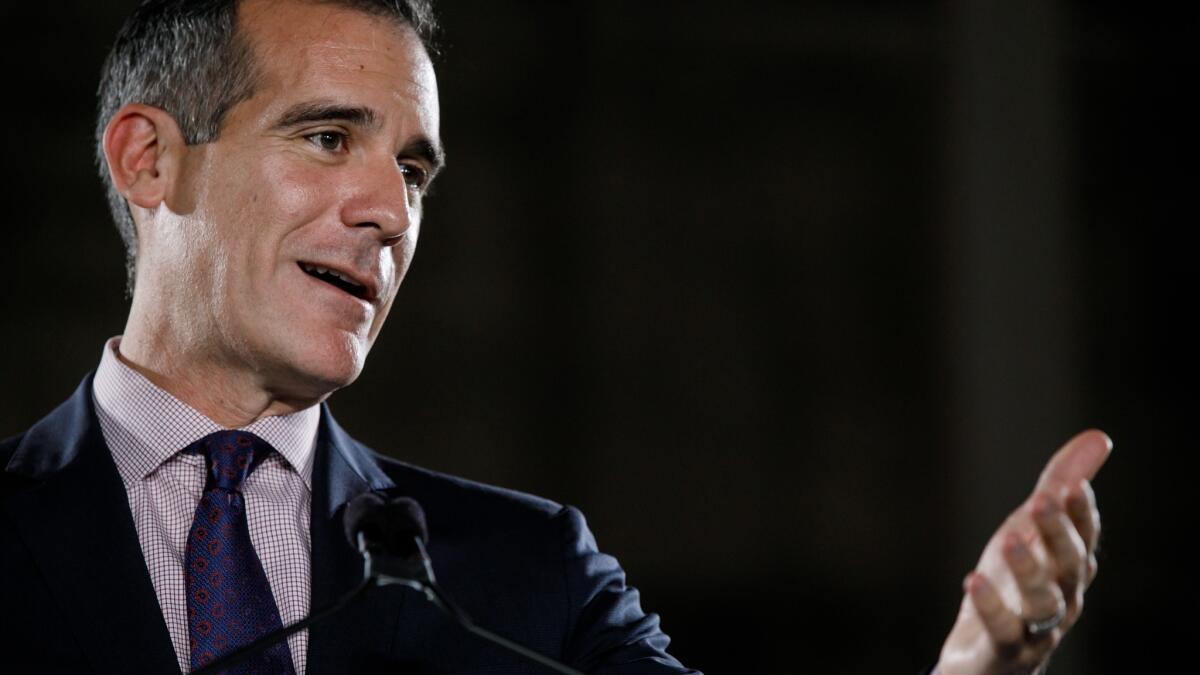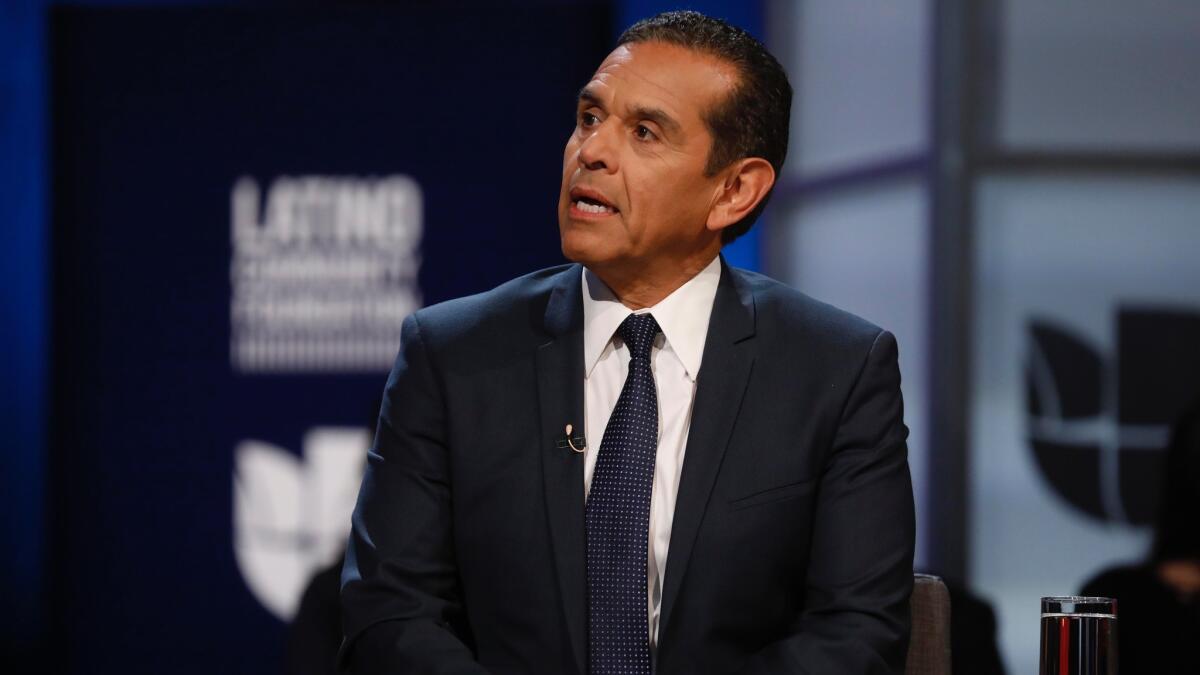Veteran L.A. cops and firefighters can work one shift, then collect double pay for years

- Share via
A program that allows Los Angeles cops and firefighters to collect their pensions and salaries simultaneously at the end of their careers was originally hailed as a no-cost way to keep the most experienced officers on the job.
But six years into the program it was clear there were serious problems, including reports that aging officers with bad backs and aching knees were joining and then immediately going out on long injury leaves — sometimes for years — at essentially twice the pay.
So leaders of the police and fire unions, scrambling to preserve the program in 2008, proposed a seemingly simple solution: require everyone entering to be on active duty.
The reform, signed by then-Mayor Antonio Villaraigosa and passed through the City Council by then-President Eric Garcetti, contained a glaring weakness: the officers only had to be “active” on the day they signed up.
The one-day rule did nothing to stop the flow of officers heading out the door, The Times found.
A questionable reform
In the decade since the rule’s creation, nearly 300 police and firefighters who joined the Deferred Retirement Option Plan took injury leaves within six months, according to the newspaper’s review of city payroll data and workers’ compensation records. Two started leaves on the very next shift, and many didn’t wait much longer.
Among them:
Los Angeles Police Department Det. Ysaias Valdez, who had previously filed at least nine workers’ compensation claims and taken a year off for a knee he hurt standing up from his desk, entered DROP in June 2014. He worked three more shifts before taking another year off for cumulative trauma to his hips, buttocks and tailbone, city payroll and workers’ compensation records show. In October 2016, he began a third yearlong injury leave after hurting his back lifting a case of paper at the office. A notation in the records blames the injury on “Lack of Knowledge/Skill/Training.”
Valdez, who has been paid $560,000 for the time off since 2008, did not respond to requests for comment. His attorney, Julie Sherman, said she was unable to discuss details of her clients’ cases.
“The vast majority of LAPD officers love their jobs and want to return to them as quickly as possible,” Sherman added, blaming their long absences on the city’s failure to approve timely medical treatment.
Fire Capt. Donna Lee’s job history includes long leaves for ankle injuries suffered playing volleyball on-duty and horsing around with co-workers while washing dishes at the fire station, according to workers’ compensation and court records. She entered DROP in 2012, worked three more shifts, and then spent roughly half of the next five years out on injury leaves. The most recent began last April after she said a computer hard drive fell off a desk and struck her right ankle but also injured her left knee, left hip and lower back, workers’ compensation records show.
The city paid Lee more than $1.2 million while she was in DROP, including $579,000 for the time off, according to the payroll data. Lee could not be reached for comment. In an email, her attorney, Amanda Deering White, said Lee’s injuries were numerous and extensive but she declined further comment.
Before entering DROP in 2013, Daniel McEleney, who worked on fire boats in the Port of Los Angeles, had already filed multiple claims for back and knee injuries he suffered stepping on and off the vessels. After joining the program, he worked four more shifts, then underwent back surgery for an old work injury he had aggravated two years earlier lifting a suitcase at the end of an Alaskan cruise. He took 14 months off to recover, payroll records show.
Shortly after McEleney returned to work, he hurt his knee again stepping off a boat and missed another five months. His injuries kept him from working for the city while in DROP but did not keep him from working part-time as a longshoreman at L.A. Harbor, according to a notation in the records from one of his doctors.
McEleney did not respond to multiple requests for comment. His attorney, Gold Lee, said that he didn’t know any details of McEleney’s reported work as a longshoreman and that he couldn’t comment on his case.
Details of job-related injury claims, which are normally confidential, become public if the case is contested and either party introduces records, such as medical reports, as evidence before the state Workers’ Compensation Appeals Board. Because the city employees and attorneys mentioned in this story declined to discuss specifics of their cases, The Times relied on the city’s copies of those records. It’s unclear if any of the employees had other injuries not mentioned in the files.
‘This is total abuse’
Fifteen years ago, former City Councilman Dennis Zine, a retired LAPD sergeant, was one of the first city officials to publicly sound the alarm that employees in the DROP program were going on lengthy injury leaves. His warnings went unheeded.
“This is total abuse of the DROP system,” Zine said when presented with The Times’ findings. By allowing cops and firefighters to routinely take such long injury leaves while in DROP, the city “is cheating the people out of public service,” Zine said.
Bernard Parks, who was police chief when the program was created, said he was shocked to learn of the one-day rule. He said he thought officers had to be working “full duty” the entire time they were in the program.
Any rule that allows them to collect twice their usual pay while not working constitutes “a major fraud against the public,” Parks said.
Jessica Levinson, an L.A. city ethics commissioner and Loyola Law School professor, said the one-day rule, “just doesn’t strike me as a straight-faced solution. It’s like a flashing red light saying, ‘loophole ahead.’”
Some want to fix the program

Five Los Angeles City Council members called for a sweeping review of DROP after a Times investigation, published this month, found that nearly half of participants from July 2008 to July 2017 had taken injury leaves, often for cumulative injuries like sore knees, carpal tunnel syndrome, and high blood pressure.
Under state law, many ailments that afflict aging bodies regardless of profession — including heart trouble, cancer, and back pain — are presumed to be job-related for public safety officers.
The Times’ computer analysis of tens of millions of city payroll and pensions records also found that once in DROP, cops and firefighters were nearly twice as likely to miss work for injury, illness or paid leave. The average absence was 10 months, but hundreds stayed out for more than a year. The city paid more than $220 million in salary and pension to DROP participants for the time off.
Since the program’s inception in 2002, cops and firefighters have received more than $1.6 billion in extra pension payments, The Times found.
Councilman David Ryu is among those calling for a thorough review of the program. “We cannot defend the indefensible. It is clear from [the Times’] investigation that abuses of disability leave must be eliminated.”
Villaraigosa termed out of the mayor’s office in 2013. He’s now running for governor with the endorsement of the largest law enforcement labor organization in the state, the Police Officers Research Assn of California. He declined to be interviewed for this story.
In a written statement, his campaign spokesman, Luis Vizcaino, said Villaraigosa had not been aware of the number of first responders taking long injury leaves while in DROP.
Asked whether Villaraigosa realized the reform measure he signed only required DROP participants to work one day, Vizcaino declined to answer.
Vizcaino also would not say whether Villaraigosa thinks it’s acceptable for police and firefighters to receive double pay while out on extended injury leaves.
Other cities drop DROP
Many cities and states across the country have experimented with DROP in the last three decades on the theory that pension payments that begin earlier are usually smaller so the cost to the employer will be offset over time. But in recent years, a growing number of jurisdictions, from San Diego to Alabama, have abandoned those programs because they found that the costs were not being offset. In most cases, that’s without calculating the added cost of time missed for injury leaves by DROP participants.
San Francisco instituted a simple rule to prevent long injury leaves in DROP: it suspended pension payments for employees while they received temporary disability payments. But the city still found the program too expensive and discontinued it within three years.
Los Angeles’ DROP program was created after voters approved a ballot measure that promised “no additional cost to the city.” It was supposed to sunset after five years.
But while other local governments were publicly disavowing DROP programs in the late 2000s, elected officials in Los Angeles made it permanent and added the requirement, without public debate, that participants be on active duty on the day they entered the program. Former Fire Capt. Steve Tufts, a leader of the firefighters union at the time, said in a recent interview that he and a representative from the police union had proposed the rule in order to satisfy city officials’ concerns about long injury leaves.
“We understood how the city was looking at it,” Tufts said. “They didn’t want someone to go into the DROP and then get paid to never work.”
Done in 17 seconds
It took then-City Council President Eric Garcetti 17 seconds to introduce the measure and to get it approved 11 to 0 by his colleagues on Nov. 4, 2008 — a day when most political observers would have been distracted by the election of Barack Obama as the first African American president.
Garcetti has since become mayor.
Asked in an email whether Garcetti realized the measure he shepherded through the City Council in 2008 only required participants to put in one day of active duty, his spokesman, Alex Comisar, sidestepped the question. “The Mayor voted for an amendment to the DROP program that requires participants to be on active duty at the time of enrollment,” he wrote.
Asked whether Garcetti now supports eliminating DROP, Comisar replied, “No.”
In a general statement, Garcetti praised police and firefighters, “who put their lives on the line every day to protect our safety.”
“We are always looking for ways to improve City policies,” he added, “and if any abuse of this program exists, we will move to fix it.”
Robert Stern, a political reform advocate who was formerly president of the Center for Governmental Studies, said he was not surprised that City Hall rubber-stamped a union-conceived provision that didn’t actually prevent abuse of the DROP program.
“It would take a very brave council member to take them on,” Stern said of union leaders. “It’s much easier to go along with them than it is to buck them. You don’t want to be running for election and face the wrath of the police and fire unions.”
Twitter: @JackDolanLAT
Twitter: @GGarciaRoberts
Twitter: @ryanvmenezes
Read the first part of The Times DROP investigation
More to Read
Sign up for Essential California
The most important California stories and recommendations in your inbox every morning.
You may occasionally receive promotional content from the Los Angeles Times.













